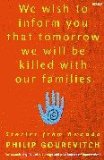Summary | Excerpt | Reviews | Readalikes | Genres & Themes | Author Bio
Stories From Rwanda

Critics' Opinion:
Readers' Opinion:
First Published:
Sep 1998, 356 pages
Paperback:
Mar 2000, 368 pages
The dead at Nyarubuye were, I'm afraid, beautiful. There was no getting around it. The skeleton is a beautiful thing. The randomness of the fallen forms, the strange tranquillity of their rude exposure, the skull here, the arm bent in some uninterpretable gesture there--these things were beautiful, and their beauty only added to the affront of the place. I couldn't settle on any meaningful response: revulsion, alarm, sorrow, grief, shame, incomprehension, sure, but nothing truly meaningful. I just looked, and I took photographs, because I wondered whether I could really see what I was seeing while I saw it, and I wanted also an excuse to look a bit more closely.
We went on through the first room and out the far side. There was another room and another and another and another. They were all full of bodies, and more bodies were scattered in the grass, and there were stray skulls in the grass, which was thick and wonderfully green. Standing outside, I heard a crunch. The old Canadian colonel stumbled in front of me, and I saw, though he did not notice, that his foot had rolled on a skull and broken it. For the first time at Nyarubuye my feelings focused, and what I felt was a small but keen anger at this man. Then I heard another crunch, and felt a vibration underfoot. I had stepped on one, too.
RWANDA IS SPECTACULAR to behold. Throughout its center, a winding succession of steep, tightly terraced slopes radiates out from small roadside settlements and solitary compounds. Gashes of red clay and black loam mark fresh hoe work; eucalyptus trees flash silver against brilliant green tea plantations; banana trees are everywhere. On the theme of hills, Rwanda produces countless variations: jagged rain forests, round-shouldered buttes, undulating moors, broad swells of savanna, volcanic peaks sharp as filed teeth. During the rainy season, the clouds are huge and low and fast, mists cling in highland hollows, lightning flickers through the nights, and by day the land is lustrous. After the rains, the skies lift, the terrain takes on a ragged look beneath the flat unvarying haze of the dry season, and in the savannas of the Akagera Park wildfire blackens the hills.
One day, when I was returning to Kigali from the south, the car mounted a rise between two winding valleys, the windshield filled with purple-bellied clouds, and I asked Joseph, the man who was giving me a ride, whether Rwandans realize what a beautiful country they have. "Beautiful?" he said. "You think so? After the things that happened here? The people aren't good. If the people were good, the country might be OK." Joseph told me that his brother and sister had been killed, and he made a soft hissing click with his tongue against his teeth. "The country is empty," he said. "Empty!"
It was not just the dead who were missing. The genocide had been brought to a halt by the Rwandese Patriotic Front, a rebel army led by Tutsi refugees from past persecutions, and as the RPF advanced through the country in the summer of 1994, some two million Hutus had fled into exile at the behest of the same leaders who had urged them to kill. Yet except in some rural areas in the south, where the desertion of Hutus had left nothing but bush to reclaim the fields around crumbling adobe houses, I, as a newcomer, could not see the emptiness that blinded Joseph to Rwanda's beauty. Yes, there were grenade-flattened buildings, burnt homesteads, shot-up facades, and mortar-pitted roads. But these were the ravages of war, not of genocide, and by the summer of 1995, most of the dead had been buried. Fifteen months earlier, Rwanda had been the most densely populated country in Africa. Now the work of the killers looked just as they had intended: invisible.
From time to time, mass graves were discovered and excavated, and the remains would be transferred to new, properly consecrated mass graves. Yet even the occasionally exposed bones, the conspicuous number of amputees and people with deforming scars, and the superabundance of packed orphanages could not be taken as evidence that what had happened to Rwanda was an attempt to eliminate a people. There were only people's stories.
(c) 1998 Philip Gourevitch All rights reserved.





The House on Biscayne Bay
by Chanel Cleeton
As death stalks a gothic mansion in Miami, the lives of two women intertwine as the past and present collide.

The Flower Sisters
by Michelle Collins Anderson
From the new Fannie Flagg of the Ozarks, a richly-woven story of family, forgiveness, and reinvention.

The Funeral Cryer by Wenyan Lu
Debut novelist Wenyan Lu brings us this witty yet profound story about one woman's midlife reawakening in contemporary rural China.
Your guide toexceptional books
BookBrowse seeks out and recommends the best in contemporary fiction and nonfiction—books that not only engage and entertain but also deepen our understanding of ourselves and the world around us.